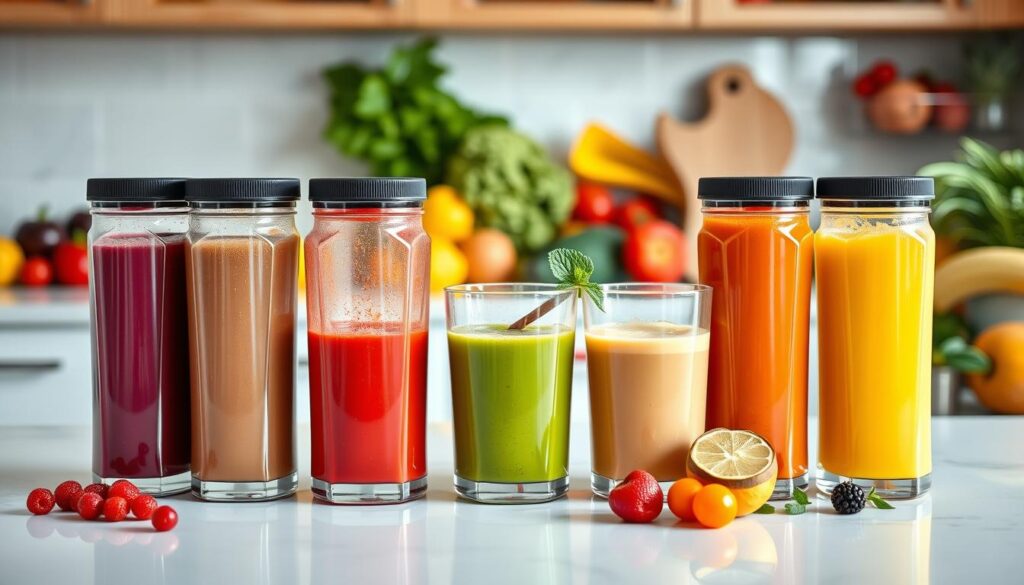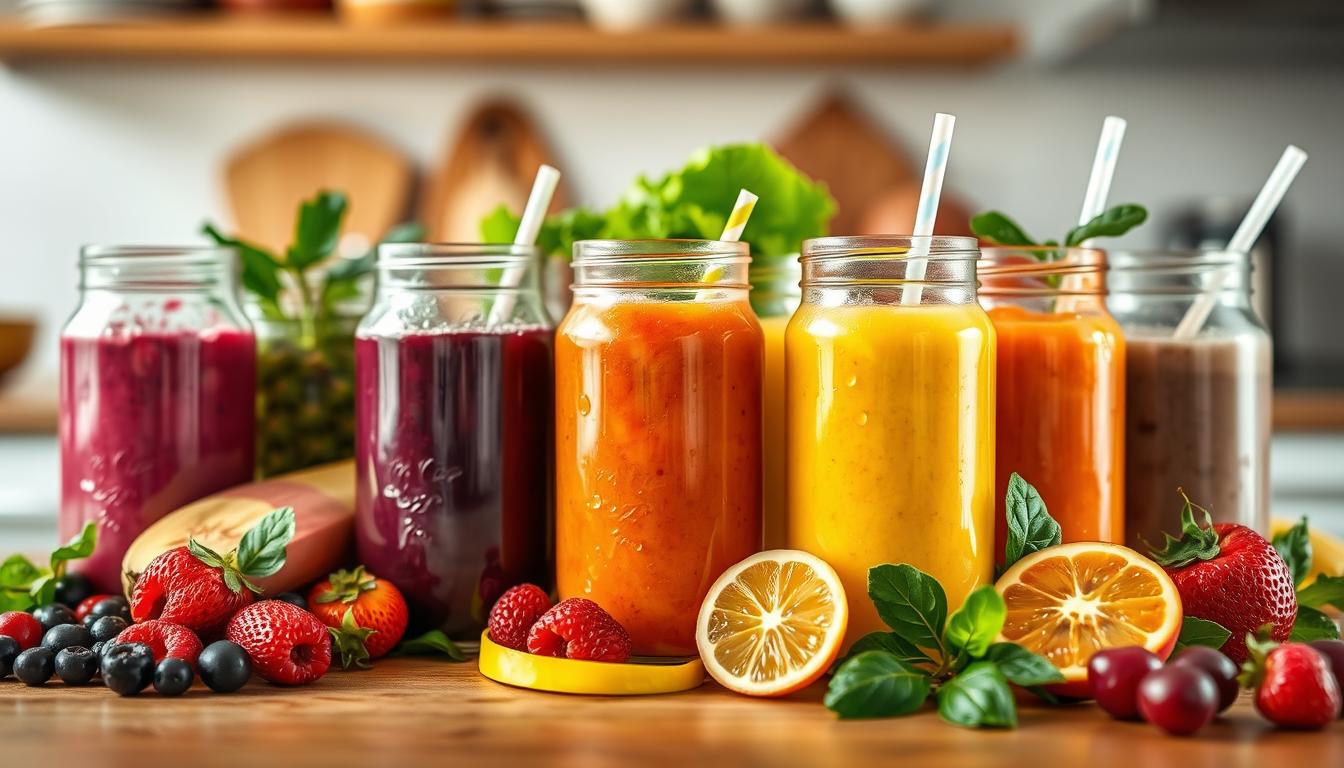I’ve explored many diets in my quest for healthy living. The liquid diet is often talked about for weight loss. But is it really effective? Liquid diets range from nutrient-rich shakes to detox cleanses that might lack important vitamins and minerals.
Medically prescribed liquid diets have their uses, but they’re not meant for long-term use. When trying to lose weight, it’s important to be cautious and informed. A quick fix might seem appealing, but lasting health requires a balanced approach.
Finding the right balance is crucial. Mixing solid foods with liquids might be better for managing calories without harming health. Many people see quick weight loss on a liquid diet, but it often doesn’t last. For lasting results, a liquid diet should be part of a broader lifestyle change, including meal replacements, exercise, and support from others.
Key Takeaways
- Liquid diets necessitate careful consideration due to potential health risks and should be supervised by a medical professional.
- Weighing the benefits of weight loss against the odds of possible nutrient deficiencies is crucial.
- For lasting results, combining liquid meals with solid foods and exercise is recommended.
- Consulting with a doctor and registered dietitian is imperative to ensure an adequate intake of calories and nutrients.
- The sustainability of a liquid diet hinges on gradual weight loss and lifestyle modifications.
- A significant percentage of weight loss via liquid diets tends to be temporary unless accompanied by continued healthy habits.
Exploring Water and Liquid Diets for Weight Loss
I’ve explored many ways to lose weight, including liquid nutrition plans. Today, we’ll look at liquid diet plans and their benefits for health and weight loss.
Definition and Varieties of Liquid Diets
Liquid diets come in many forms, from clear liquid diets to full-liquid diets. They are often low in calories, helping with quick weight loss. Detox diets use juices and infused waters to remove toxins. Medically prescribed diets are for those preparing for or recovering from surgery.
How Meal Replacements Function in a Liquid Diet
Meal replacement shakes are a key part of liquid diets. They’re used in detox diets and daily by many. Truvy’s Trim Kit, for example, offers balanced nutrition and helps control hunger while keeping calories low.
Detox Diets and Their Role in Shedding Pounds
Detox diets are known for quick weight loss and cleansing the body. But, they should be used short-term. Pairing them with long-term, nutrient-rich diets is better for health and weight loss.
Understanding Medically Prescribed Liquid Diets
For some medical conditions, liquid diets are necessary. They are used under doctor’s orders and are designed to be gentle on the stomach. They provide hydration and nutrients without solid food.
| Type of Liquid Diet | Purpose | Caloric Content | Typical Duration |
|---|---|---|---|
| Detox Diets | Cleanse and weight loss | 400-800 calories/day | 3-7 days |
| Meal Replacement Shakes | Nutrition and weight management | Variable | As needed |
| Medically Prescribed Liquid Diet | Pre/post-surgery | Low | Until recovery |
| Full Liquid Diet | Transition diet post-surgery | Higher than clear liquids | Post-surgery recovery period |
Exploring liquid nutrition through a liquid diet plan shows the importance of knowing your health goals. Whether it’s using meal replacement shakes for convenience or a detox diet for a cleanse, each method needs careful thought and balance.
Can Water and Liquid Diets Really Help You Shed Pounds?
Many people are drawn to water and liquid diets for quick weight loss. They work by cutting calories, which can lead to fast weight loss. But, are they good for keeping weight off for good? Let’s take a closer look.
The Caloric Deficit Conundrum
Liquid diets cut calories, leading to weight loss at first. Drinking lots of water can also boost metabolism and help remove waste. This is key when you’re trying to lose weight.
A 2015 study showed that women who drank water after lunch lost more weight than those who didn’t. This highlights the role of water in weight loss.
Reintroducing Solids: The Transition Phase
Going back to solid foods is hard for those on liquid diets. It’s important to slowly add solid foods to avoid gaining weight back. A plan for adding solids helps manage calorie intake and keeps metabolism stable.
Adjustments should be based on individual needs, health history, and lifestyle. This ensures progress is not lost.

Risks and Rewards of Low-Calorie Liquid Diets
Low-calorie diets can lead to fast weight loss, but they come with risks. They can cause nutrient deficiencies if not done right. This is especially true if the diet goes on too long.
It’s crucial to get professional advice to avoid nutritional imbalances. This ensures health is not compromised.
In summary, water and liquid diets can help with weight loss by cutting calories. But, their success depends on careful planning and transitioning back to solid foods. Remember, lasting weight loss comes from making healthy lifestyle changes, not quick fixes.
Pre-Surgery and Digestive Health: Other Uses of Liquid Diets
Liquid diets, like clear liquid diets and liquid nutrition, are key in medical settings. They help with digestive health and getting ready for surgery. A pre-surgery diet is important for safe and successful operations, especially bariatric surgery.
People getting bariatric surgery often lose 10-15 pounds before surgery. This weight loss helps manage weight long-term and lowers surgery risks. It also makes the surgery easier by reducing liver size by 25%.
Interestingly, men tend to lose more weight on these diets than women. But, about 25% of patients might gain weight back if they don’t stick to a healthy lifestyle. This shows how important it is to prepare both physically and mentally.
Clear liquid diets are also vital before GI tract procedures like colonoscopies. They make sure the digestive tract is clean, reducing risks of infections. They can also help with symptoms of Crohn’s disease and diverticulitis, though they’re not a long-term fix.
But, clear liquid diets have their downsides. They’re low in calories, which can make you feel hungry or tired. They can also lead to nutritional imbalances if followed for too long without expert advice. So, it’s important to talk to a healthcare professional before starting.
In conclusion, while clear liquid diets are useful in medical prep and recovery, they need careful use. They’re good for digestive health and surgery prep, but it’s important to weigh the benefits and risks.
Practical Applications: When Liquid Diets May Be Beneficial
In my quest for a healthier lifestyle, I’ve tried many diets. Liquid diets are known for their quick results in weight loss. But when are they good to use? Let’s look into liquid meal replacements and the importance of nutrition.
Meal Replacements vs. Total Liquid Diets
Liquid meal replacements and total liquid diets have different uses. If you want to lose weight and keep it off, liquid meal replacements might be better. They offer 500 to 1,500 calories a day, helping with weight loss when paired with solid foods.
Duration and Sustainability of Liquid Dieting
Sticking to liquid diets for a long time is not always wise. Studies show they can lead to fast weight loss but might not help keep it off. It’s best to see them as short-term solutions for quick weight loss or health needs.
The Importance of Nutrient Intake on a Liquid Diet
When you mostly drink liquids, getting enough nutrients is key. Diets lacking fiber, fat, and protein can cause problems like dizziness. It’s important to make sure these diets have all the necessary vitamins and minerals.
| Meal Type | Caloric Intake | Typical Duration | Expected Weight Loss |
|---|---|---|---|
| Liquid Meal Replacement | 500-1,500 calories/day | Varies; up to 30 days with reintroduction phases | 25-57 lbs under supervision |
| Total Liquid Diet | 500-800 calories/day | Short-term (few days to weeks) | Rapid initial weight loss, varies significantly |
| Juice Cleanse | Varies | 1-3 days typically | Minor, mostly water weight |

Using liquid diets should be done with health goals in mind and under a doctor’s watch. They can be helpful for losing weight or starting a new diet plan. But, they must be used correctly to avoid health problems and get the best results.
Long-Term Implications and Psychological Effects
Keeping a healthy lifestyle after a liquid diet is more than a quick fix. It means changing how you think about food and dieting for good. We’ll look at the mental and lifestyle changes needed to keep weight off for good.
Challenges of Maintaining Weight Loss Post-Diet
Switching from liquids to solid foods is tough. It’s easy to fall back into old, unhealthy eating ways. To keep weight off, you need to adopt new, healthy eating habits. Start by adding solid foods slowly, choosing foods that are good for you and eating the right amounts.
Changing Habits: The Key to Prolonged Success
Changing how you eat is key to keeping weight off and living healthy. This change needs a big effort, including what you eat and how you behave. Getting help from a nutrition expert can make a big difference. They can create a diet plan that fits your needs and likes. Making these changes a part of your daily routine can help you stick with them.
The Psychological Battle: Staying Motivated Without Solids
One big challenge after a liquid diet is staying motivated without the variety of solid foods. Being mentally strong is crucial. To stay motivated, remember your progress and keep up with your healthy choices. Having a supportive group or a mentor can really help keep you on track.
| Aspect | Role in Sustainable Weight Loss | Strategies for Success |
|---|---|---|
| Nutritional Guidance | Ensures balanced intake of nutrients | Consult dietitians, tailored meal plans |
| Behavioral Adjustments | Helps in adapting long-term healthy habits | Set achievable goals, habit tracking |
| Psychological Resilience | Manages desires, maintains motivation | Support groups, focus on non-food rewards |
After a liquid diet, the goal is to build a healthy lifestyle. This means changing your eating habits and staying motivated. This approach not only helps keep weight off but also improves your overall health and well-being, leading to a balanced and resilient life.
Conclusion
My weight loss journey has taught me a lot about liquid diets. They promise quick weight loss, but it’s not always easy. Short-term fasting can lead to a 4% to 6% weight loss in just five days.
But, I’ve learned that these diets aren’t for everyone. They can lead to significant weight loss, but it’s hard to keep it off. Water is key for our health, and we should drink up to 15.5 cups a day.
Drinking water before meals can help with weight loss. But, it’s important to do it safely. Liquid diets need to be balanced and include exercise and healthy habits.
It’s also important to watch out for side effects like diarrhea. If not managed right, it can cause dehydration. Proper diet and hydration are key, as shown by tips on managing diarrhea during fasting.
Liquid diets can be part of a healthy weight management plan. They should be used carefully and in balance with our body’s needs. This way, they can help us reach our goals without harming our health.




